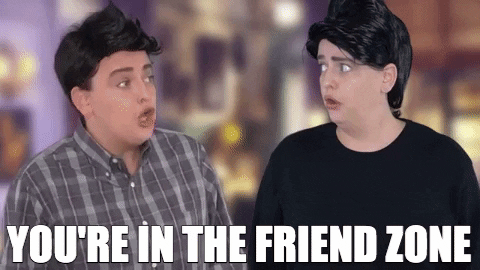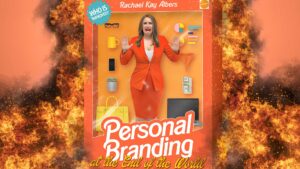Listen to the audio version. This essay is available as a podcast!
Some businesses have no business being "scaled."
The celebrity personal brands who dominate the conversation around online business have an obsession with “scaling” your business model that has created a mythology of “easy” passive income that lines their pockets while keeping most small business owners out in the cold.
I can’t count the amount of entrepreneurs who have arrived at my doorstep telling me they’ve been trying and failing to “scale” and finally hit that coveted 7 figure mark (or 6 or even 5!) and wondering what’s wrong with them.
They watch celebs like Marie Forleo, Amy Porterfield, or Laura Belgray flex their colossal launch numbers and mistakenly believe they’re just “one funnel away” from replicating the same results.
But before I talk about the ethical problem with scaling and what you should do instead, let’s break down the 7 elements that make up a bloated 7-figure launch:
- Affiliates with big lists
- Manipulative testimonials
- Brand omnipresence through ads and email spam
- Underpaid subcontractors
- Cult of personality aka the power of a celebrity personal brand
- Price gouging through artificially inflating perceived value
- Replacing 1:1 attention with a high volume of students
Very few, if any, celebrity personal brands achieve big launch numbers without leveraging the built-in audiences of their affiliates. It is costly and time consuming to turn a “cold” lead — someone who has never heard of you — into a paying customer.
Folks like Marie Forleo and Tony Robbins re-sell the same thing again and again with great success, not on the power of their product, but by expanding to new audiences that are unfamiliar with what they offer — and very familiar with a personal brand they trust.
This is why I call Dean Graziosi the “Kutcher Catcher.” He and Tony Robbins used Jenna Kutcher for access to her audience of people who were new to their offer and its merits (or lack of).
Selling through affiliates is a shortcut around nurturing an audience and building trust over time. Instead, affiliate marketing relies on the trust someone else has already built with their own audience.
7-Figure Launch Secret #2. Manipulative Testimonials
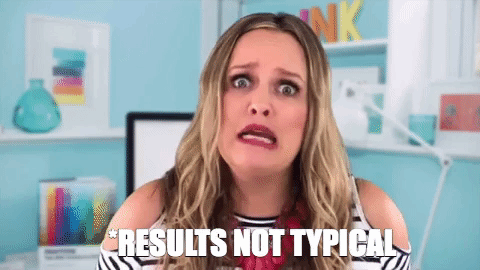
Scroll any sales page and you’ll see plenty of stories about students 10xing this and skyrocketing that. Scroll all the way down and you’ll find the disclaimer, hidden in fine print: “Results not typical.”
Not only are these testimonials manipulative because they suggest massive results are the rule, instead of the exception, but these stories often come from business owners who either already had successful businesses to begin with or experienced a program while it was still intimate and personalized.
Marie Forleo uses famous students like Amy Porterfield or Laura Belgray to prove the value of her B-School program while obscuring the fact that they took the course while she was still offering 1:1 support. Not to mention the fact that in Amy and Laura’s case, they spent 5 figures to be part of Marie’s original “Rich, Happy, and Hot” mastermind — whose curriculum ultimately formed the foundation of B-School — where they worked directly with Marie in a small group setting, amidst other industry leaders like Gabrielle Bernstein, Kris Carr, and Laura Roeder.
Their success came, in part, from the affiliate sales they all made for each other in the years following their work with Forleo. But their sales pages and affiliate emails don’t tell you that — they simply say, “I took B-School and had amazing results!” while obscuring the main factors that contributed to their success.
7-Figure Launch Secret #3. Brand Omnipresence Through Ads & Email Spam
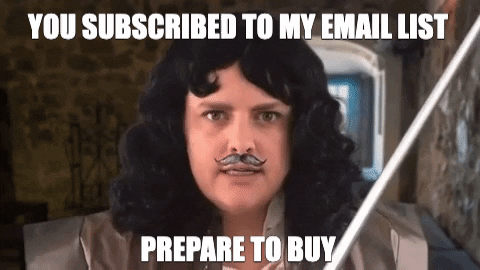
There’s a reason the month of February has become known in the industry as “B-School Season.” If you happen to follow anyone in Marie Forleo’s league of affiliates, you can expect a deluge of emails, social content, and targeted ads following you around the Internet, whispering sweet nothings about passive income in your year. If you follow multiple affiliates, that whisper quickly becomes a scream.
A scaled model like Marie’s relies on driving a huge volume of prospects into her funnel, knowing that with enough coaxing, a small percentage will convert into sales. But, within this approach, an email or two just won’t do.
The B-School model is meant to wear you down, lower your defenses, and gaslight you out of your objections through many, many advertising touch points. Back when I was still subscribed to her affiliates’ lists, on cart close day alone, I could receive between 50-100 emails collectively, with their own twist on the high pressure “last chance” headlines.
If you listened to Episode 6 of the Marketing Muckraking podcast, you heard me talk about how I almost became ensnared by B-School in this exact way. Despite having a healthy, thriving business — which makes me a bad candidate for B-School because I already know everything she teaches there — the annual hurricane of ads had me questioning whether Marie was keeping some “secret” I needed to get to that “next level” everyone was always yapping about.
Omnipresence is a form of propaganda — and it works. I wrote about this in my article, “How to Lose Friends and Alienate People,” and how during World War I, the Creel Committee realized how to manipulate public opinion by simply repeating the same message everywhere: in newspapers and films and posters and signs and so on and so forth.
This is how advertising earned its chops as a legitimate business tool. The powers that be realized they could overpower the masses and subvert an individual’s reason and logic through sheer force. Check out the article for more on how Edward Bernays, the “father of public relations,” used these methods to popularize women smoking and help orchestrate the 1954 Guatemalan coup.
7-Figure Launch Secret #4. Underpaid Subcontractors
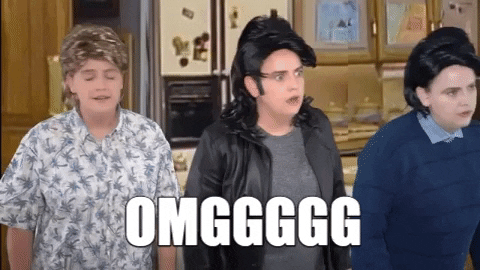
If you followed FREE SCHOOL, you might remember that I briefly had a relationship with The GirlBoss who invented gaslighting and gatekeeping, Sophia Amoruso. She found me while in a launch push for her Business Class program and happened upon one of my episodes of Awkward Marketing.
I won’t hide that, yes I was starstruck. One minute I’m making GirlBoss parody videos, the next I’m in the DMs with The GirlBoss herself, asking me advice about how to DIY her launch emails and whether her private jet spoof videos were funny. (They weren’t.) What she didn’t know was that I was friends with several of the copywriters she had interviewed to write copy for her course.
But she didn’t hire them. They were too expensive.
Crying poor is pretty rich for someone who touts her “$100 million in revenue” as a sales page selling point.
Let’s be real, launch copy is a big job. Copywriters are tasked with writing thousands of words for sales pages, dozens of variations on ad creative, and often hundreds of emails to boot. Not to mention, they must spend the time to familiarize themselves with the course creator and their teachings to emulate their voice and properly capture the features and benefits of the program.
Celebs like Sophia Amoruso gaslight themselves into undervaluing the work of copywriters, designers, integrators, and assistants by referring to these specialists as “technicians” and “mechanics” — actual words I’ve heard from industry leaders who want to hire me — to justify paying a pittance. (This opens up a whole can of worms around how capitalism relies on exploiting billions of workers and paying them pennies for the production that makes the Bezii of the world filthy rich. But that’s muckraking for another day.)
Behind every GirlBoss with a social feed full of “relatable” stretch marked vulnerability posts is a team of people working 12 hour days to create a scaled illusion of authenticity.
7-Figure Launch Secret #5. Cult of Personality, i.e. The Power of a Celebrity Personal Brand
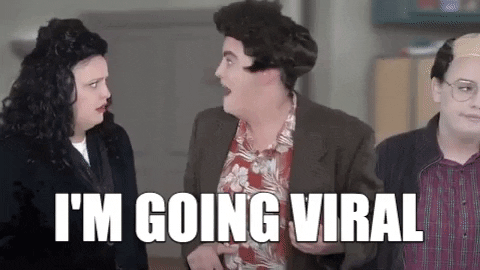
If I’ll give Marie Forleo any credit, it’s this — she was an early adopter of personal branding. Forleo famously cites how she started her email list with a yellow legal pad and had her hip hop dance students sign up at the end of class in the early 2000s.
I first learned of Forleo when my very first client shared this same story when she hired me in 2009 to essentially copy paste the Marie method. It was also this client who had me write blogs about The 4 Hour Work Week and keep my eye on “That Funny Talking Shrimp” and “The Facebook Girl” — who pivoted to become Online Marketing Made Easy’s Amy Porterfield. Little did I know, this client was planting the seeds of FREE SCHOOL in my soon-to-be muckraking heart.
This client may have been the first, but she was certainly not the last — over the years I’ve had hundreds of people come my way all begging me to build a brand for them like Forleo’s. It’s why I wrote my viral article, “You Don’t Want Marie Forleo’s Website,” when I was still kissing the industry's ass. The article goes easy on Forleo and focuses instead on how emulating someone whose brand you admire does not mean you’ll duplicate their success.
The scores of passive income hopefuls who have come my way are all drawn in by Marie’s “girl next door” vibe and their mistaken belief that they, too, are just a few vlogs and subscribers away from becoming a B-Schoolesque case study.
But Marie was a runaway hit, not because she simply applied her own teachings, but because she was one of the first to do so. She leveraged lead magnets and content marketing to build her list and brand equity when no one else was doing so. The practices she used to gain traction are now outdated and overdone. (But don’t tell that to her testimonials!)
She earned her celebrity status — and her Oprah shout out — by being the first to the game. And now she leverages this celebrity as her proof of concept.
This is a pivotal reason why her affiliate marketing works. Even if someone has never heard of Marie Forleo before, when they are introduced to her by someone they trust, and then they check her website and see Oprah’s name on it, that combination of existing affiliate trust and the power of a celebrity personal brand offer a swift one-two punch.
“They wouldn’t be rich and famous if they didn’t know something I don’t,” is the #1 strategy for overcoming her prospects’ objections when they’re considering buying B-School.
7-Figure Launch Secret #6. Price Gouging Through Artificially Inflated Perceived Value
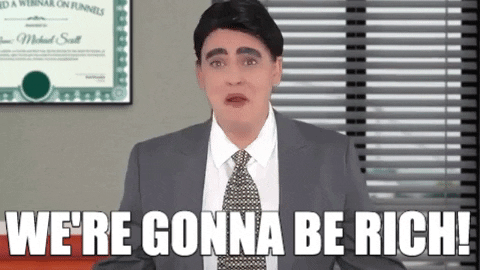
It is this cult of personality I'm talking about in #5 that creates an illusion of $2500 value for a program that parrots what you can find for free on Google.
This is the bedrock of branding. Brands were born to imbue products with an illusion of superiority so they could compete in the marketplace. Why do you buy Coca Cola and not the bargain brand? Because you’ve been trained to associate Coke with a feeling; that feeling doesn’t come from a can, it comes from a marketing campaign.
And this is the pricing advice celebrity business coaches pass onto their students under the fluffy label of “money mindset.”
“Charge what you’re worth,” they say. This is the argument behind scaling businesses that have no business being scaled. When you’ve reached a certain income threshold, the only way to make more money is often to raise your prices beyond the actual value of what you’re offering.
When it’s gas or Lysol, we call that what it is — price gouging. But when it’s a coaching program, we have been brainwashed to call it “high ticket.” What we should really call it is unethical and exploitative.
7-Figure Launch Secret #7. Replacing 1:1 Attention with a High Volume of Students

7-figure launches rely on volume, results be damned. This is the biggest scaling trap. Small businesses begin to fantasize about the fairy tale of “passive income” — the myth that you can make dickfunnels full of money without actually engaging in your business anymore.
I find it heartbreaking and distressing when I meet a talented business owner who has validated their offer, helped oodles of people in 1:1 and group settings, and now believes that they are “leaving money on the table” if they don’t extract themselves from the equation and take their solution to the masses.
When they do this, they are stripping their services of the very value that validated the offer to begin with — personal attention. As I shared in my article, “How To Be An Overnight Success,” celebrity business coaching programs that operate in this way aren’t actually coaching people to build businesses; they’re recruiting followers into their flock to reinforce the mythology that made them millionaires.
A high ticket program without personal attention is relying on price gouging and cult of personality to bilk buyers into spending their hard earned money on something that is a far cry from the experience that earned its early testimonials.
I don’t care how good your program is, if you’re not giving students tons of tailored attention, you shouldn’t be charging high ticket prices. But hey! What do I know? I’m just the lowly “technician” people hire to really help them when the big box didn’t work.
“Scaling” in this way simply isn’t sustainable or ethical for most businesses.
But there is a way to free your time and ease back on long work weeks and I explain it in this video. Watch to see how I "scaled" my personalized 1:1 branding experience into a more efficient client system (and a live group course) without removing personalization from the equation.
It’s the behind the scenes of how I work with my clients, how I free up my time, all without watering down something that has no business being scaled.
And if you're looking for a business coach or a brand strategist, I urge you to only invest in programs or experiences that put personal attention front and center. And lots of it.
You need a talented tailor, not a big box.
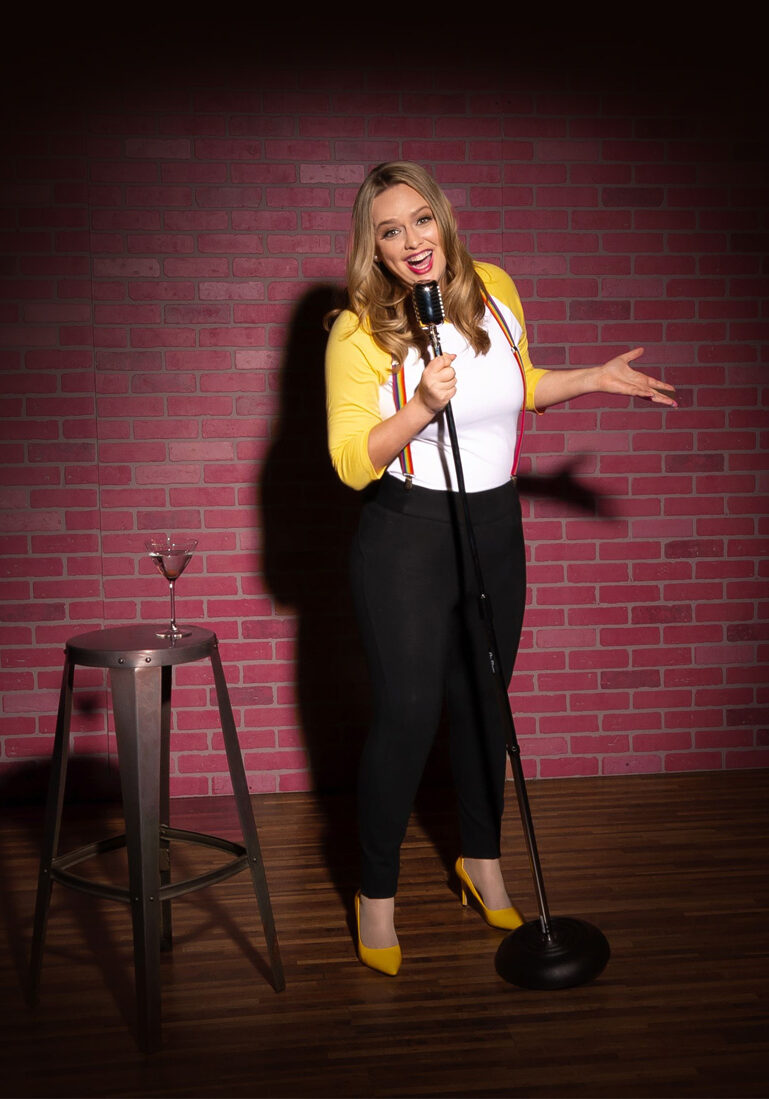
WTF is FREE SCHOOL? Comedian and court jester of the royal shit show that is online marketing burns it all down in her Instagram stories. It's the biggest biz art experiment of all time!
My name is Rachael Kay Albers and the kids call me the One Woman SNL of Business Comedy (because I tell 'em to). I'm a brand strategist, business comedian, and a helluva good time.
I started FREE SCHOOL as a free business school and creativity university on Instagram. But then I followed Ranchard Branson into a rabbit hole shaped funnel and found myself muckraking my way into the madhouse. Literally. Muckrake with me here. It's a wild ride.
If you liked this, read on:
In many ways, it seems easier to become a “personal brand” version of yourself than to be yourself. Brands are built on simplicity. A “good”…
Read More...Rebrand TOO MUCH to SO MUCH. Instead of saying, “She’s TOO MUCH,” say, “She’s SO MUCH.” You’re welcome. Lessons on burning it all down…
Read More...In 2021, I started a business / art experiment called FREE SCHOOL. I didn’t know at the time that this school would teach me to free myself. What happens after you burn it all down?
Read More...
